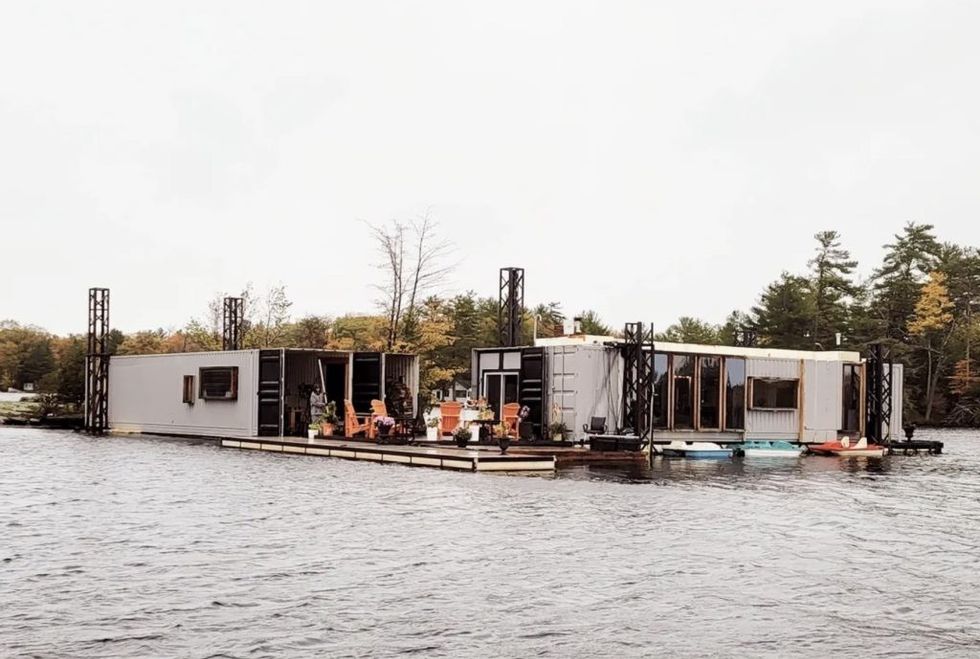Ontario is cracking down on floating homes, a move that rather wittingly zeros in on those that bob along the shores of its cottage regions. More specifically, the Province is looking to amend its Public Lands Act, with the hopes of curbing the number and nature of floating structures that can be used for overnight accommodation on Ontario waterways.
According to documents from the Ministry of Natural Resources and Forestry, the province has observed an uptick in “the number and types of structures being used for overnight accommodation on Ontario’s lakes and rivers.”
“We have heard increasing concerns related to floating accommodations,” continues the Ministry. Floating accommodations -- defined as “floating structures designed principally to provide accommodation for longer stays similar to a cottage” -- have also taken on a certain ambiguity in terms of things like taxation and policing, as well as their environmental impacts.
Under the proposed amendment, floating accommodations, including float homes and barges with residential units or camping facilities, would be barred from overnight stays on "waters over Ontario’s public land." Most navigable lakes and rivers in the province would fall into that classification. The restrictions proposed, says the Ministry, “are intended to reduce the environmental and social impacts of floating accommodations.”
“None of these changes would impact a boater’s ability to navigate, including reasonable mooring or anchoring,” it goes on to stipulate. “Also, none of the proposed changes would apply to Indigenous communities or persons exercising Treaty or Aboriginal rights.”
The Georgian Bay Association (GBA) is one of the bodies vocally in support of “appropriately” regulating floating accommodations. Since March, the group has been encouraging residents to speak out in favour of the proposed changes to the Public Lands Act, saying that increased restrictions will help to “reduce the environmental and social impacts of floating accommodations,” including with respect to pollution and wastewater management.
In addition, GBA is rallying behind regulatory changes that will improve safety for those utilizing the floating units -- floating accommodations “have poor navigability and are unstable in high winds/waves,” says the group -- while paving the way for a proper taxation system to be put in place.
On the flip side, Ontario Sailing is one of the entities to voice opposition to the proposed regulation, saying in a recent post that limiting the right to anchor on most bodies of water in the province will “have a serious impact on boaters wishing to anchor while cruising” and, on a more serious note, “will effectively eliminate many ‘safe harbours’ used in bad weather.”
Given the polarized nature of the matter, whether or not the proposed regulation will be put in place remains to be seen. The province is seeking the public’s input on the matter and consultation closes at 11:59 p.m. today, April 11, 2023.
In any case, this is not the first time Ontario has prompted the public to weigh in on floating homes. Last March, the Ministry of Northern Development, Mines, Natural Resources and Forestry heard from over 400 public, Indigenous communities, municipalities, and other stakeholders about “possible future regulatory amendments related to ‘camping’ on waterways and the use of floating accommodations over Ontario’s public lands.”
At that time, grievances were aired about impacts on waterway access, water quality, wildlife, and wastewater management, as well as concerns relating to duration of use, a lack of taxation and permitting systems, and implications related to congestion, noise pollution, aesthetics, and for private property owners.
Stakeholders overwhelmingly voiced opposition to floating accommodations, expressing that "the current rules for what structures or things may be placed or used for overnight accommodation on water were too permissive."
No regulatory changes were proposed at that time, and the matter has since been transferred to the Ministry of Natural Resources and Forestry.






















